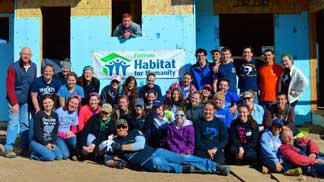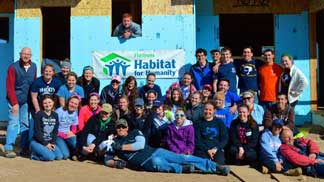 KINGSTON, R.I. – March 11, 2015 – Each year during spring break, the University of Rhode Island Habitat for Humanity and URI S.A.V.E.S. organizes Alternative Spring Break, a trip for students who are dedicated to service learning. While some may spend their break relaxing or traveling to a tropical island, these participants visit cities all over the U.S. and engage in different volunteer projects that include building homes, food bank visits and more. This year, 48 URI students will be traveling to two different locations – Charleston, S.C., and Little Rock, Ark. – from March 14 through March 21 for Alternative Spring Break.
KINGSTON, R.I. – March 11, 2015 – Each year during spring break, the University of Rhode Island Habitat for Humanity and URI S.A.V.E.S. organizes Alternative Spring Break, a trip for students who are dedicated to service learning. While some may spend their break relaxing or traveling to a tropical island, these participants visit cities all over the U.S. and engage in different volunteer projects that include building homes, food bank visits and more. This year, 48 URI students will be traveling to two different locations – Charleston, S.C., and Little Rock, Ark. – from March 14 through March 21 for Alternative Spring Break.
Hannah Lavin is one of those students. A junior majoring in marketing and Spanish, Lavin will be participating in her second Alternative Spring Break trip, this time as a co-leader and planner. We asked Lavin to tell us more about the group’s upcoming trip to Charleston, S.C., as well as her involvement in the program.
How long have you been involved with URI’s Alternative Spring Break program?
I attended my first Alternative Spring Break trip last year when the group went to Denver, Colo. This is my second year involved with the program and I am now a student leader of the trip.
What is your favorite memory from the Alternative Spring Break trip?
My favorite part of Alternative Spring Break cannot be summed up by a single memory! This trip was an eye-opening experience for me in so many ways; in addition to simply being able to serve and make an impact with such amazing organizations and people, one of the most memorable aspects for me was actually getting to know the people we worked with in Colorado and hearing their inspiring stories. These stories have truly stayed with me and motivated me to further my passion and efforts in service.
Another memory that I have from last year’s trip was working in the roof beams of a house in Colorado that was undergoing construction by Habitat for Humanity. The view from the top of this house was breathtaking, the span of the Rocky Mountains in full view. Myself and a few other students on the trip were using nail guns to attach the beams together. The height was pretty frightening and we were all a bit nervous with the winds gusting at full speed around us. But, with those distractions aside, the experience became something significant in my memory. I realized that by simply nailing these beams together in midair, we were contributing to the process of providing someone with a home who needed it. This was a very powerful realization for me and reminded me of the impact, big or small, that anyone can have by lending themselves and their time to help another.
What is Alternative Spring Break?
Every year for the past five years, URI S.A.V.E.S., and the URI Habitat for Humanity Alternative Spring Break program have served as catalysts for student engagement, growth, and leadership development. These weeklong trips immerse students, staff, and faculty in complex social issues through volunteerism, experiential learning, and reflection. Many of the students return home with new perspectives on social issues and a commitment to further civic engagement in our local community.
These trips are an incredible opportunity for students who enjoy service to travel to a different state that has experienced a recent natural disaster. In the past, the program has worked at Habitat for Humanity build sites, Habitat for Humanity ReStores, local food banks and more. During this year’s trip to South Carolina, we will also be volunteering with an oyster restoration program, as well as a senior assisted living home. Those on the Arkansas trip will be serving alongside Habitat for Humanity, as well as organizations including the Arkansas Dream Center and Arkansas Rice Depot.
For students who might not be as interested in traveling to perform service and are looking for local opportunities, there is also a Rhode Island Alternative Spring Break through URI where students stay at the Catholic Center on campus and serve with organizations throughout Rhode Island. In addition, the South County Habitat for Humanity also runs an annual spring break program in Rhode Island.
How are students chosen for the trip? Are there any requirements or necessary skills students will need?
For URI S.A.V.E.S. and URI Habitat for Humanity’s two out-of-state trips, students are chosen through an extensive interview process. After completing the written application, qualified students are invited to a group interview that involves discussion and questions about service. If they are selected to proceed in the process, they will receive an individual interview.
Next, the student leaders select the trip participants. The two trips this year accepted 20 students for each trip, not including student leaders. There are no requirements or necessary skills that students need for the trips. The trip is open for campus-wide applications, although URI S.A.V.E.S. and URI Habitat for Humanity members are encouraged to apply. Also, after the trip, many of the participants become active members in these student organizations.
Who funds the trip?
Students raise funds through letter-writing campaigns, candy fundraisers, and local restaurant dinner fundraisers. We have received donations from generous sponsors including the Westchester Bank, Leach and Gardner, Wakefield Rotary Club, the Rotaract Club, Charlestown Ambulance-Rescue Service, and we won a grant from the John Hazen White Sr. Center for Ethics and Public Service.
What is a typical day like while on the trip?
A day in the life of an “ASB kid” (as we like to say) might go a little something like this: Wake up (early!) around 6 a.m. or 7 a.m., and get dressed and ready for the day. We eat breakfast at the facility where we’re staying and make our lunches for the day. We then depart in the vans to the service site that we’re working at that day. Service usually lasts through the morning and into the afternoon. Depending on the day, sometimes we’ll do some off-site exploring, and we’ll venture into a nearby city or check out a popular attraction.
Then, we return to the facility where we’re staying to shower and get ready for dinner. We have small teams of students within the group who make dinner each night. In the past, we’ve had pasta dinners, taco night, breakfast for dinner, and more. Following dinner, the student leaders hold reflection for the group where we discuss and share things relating to the service that we performed that day, the impact it had on us, what we have taken away from the day, and more. There is often some time after dinner to hang out, catch up on homework, and play games, but we are usually pretty exhausted at this point in the day!
Where do students stay during the week?
This year, the groups for both trips will stay at a local church in the area. The Little Rock, Ark., trip will be staying with Pulaski Heights United Methodist Church. The Charleston, S.C., trip will be staying with Sunrise Presbyterian Church. They have offered to host us free of charge, which is extremely generous.
What made you choose to go on the Alternative Spring Break trip?
Having been a transfer student at URI last year, I was looking for ways to get involved on campus. The Alternative Spring Break program caught my attention and was truly everything I was looking for, incorporating service, meeting new people, and of course, giving me one of the best and most influential weeks of my life!
I have gained so much from this program. I have grown as a person and learned about myself and what I value. I have also attained leadership skills, as well as vastly expanded my definition of service and gained a better understanding of its purpose and importance. Lastly, but most certainly not least, I have met amazing people and some of my best friends through this program. I cannot imagine my college experience without the ASB trips!
This release was written by Lucio Andreozzi, an intern in the Department of Communications and Marketing.
Photo is courtesy of Hannah Lavin.

